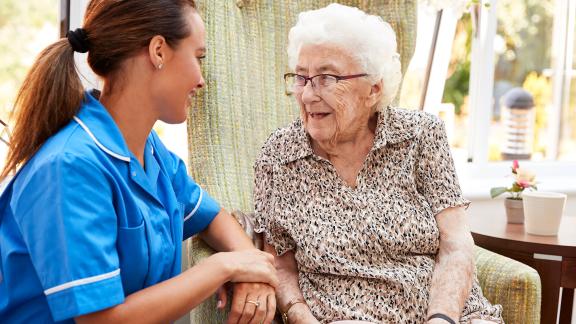Pre-transfer clinical discussion and assessment (PTCDA) : Leicester, Leicestershire and Rutland ICS

Leicester, Leicestershire and Rutland (LLR) has a growing population of significantly frail older people living in long-term residential care, as well as in the community. These individuals may have cognitive and functional impairment, with underlying complex co-morbidity.
A pilot pre-transfer clinical discussion and assessment (PTCDA) scheme involving system partners was launched in March 2020, which minimised the need for this vulnerable population to be admitted into hospital, even at the height of the pandemic.
Key benefits and outcomes
- Integrated working has upskilled the knowledge of frailty and end-of-life care, resulting in a significant decrease in the risks posed to care home residents and older people living in the community by hospitalisation.
- It is estimated that the pilot has so far led to the avoidance of 577 hospital admissions, 2,885 bed days and 730 ambulance journeys.
- The collective financial savings of the PTCDA pilot scheme to date total £395,245.
- Working closely as a team has created a culture of respect that has helped to reduce the duplication of assessments, benefitting both patients and staff.
What the organisation faced
Many frail, older people in care homes and in the community were approaching the end of their life, with hospital admission often resulting in poor outcomes. Admission was often a ‘herald event’ of ensuing poor health, physiological and functional decline as individuals struggled to recover from an acute illness. The time-consuming and often repetitious nature of the geriatric assessment process (sometimes by different teams) added to patients’ discomfort, with the added frustration that a person’s health needs weren’t effectively being addressed on a holistic level.
Additionally, the overall tendency of hospital care to focus on prolonging life through medical intervention often didn’t align with the person’s own wishes and came with high associated costs of reduced comfort and dignity. Mortality rates were unsurprisingly high amongst these ‘high user’ patients.
LLR recognised there was a need for tailored and person-centred care that recognised the benefits and burdens of different treatment options in each person’s own unique circumstances, resulting in a plan that respected their wishes and preferences.
What the organisation did
A clinically-led pilot scheme for pre-transfer clinical discussion and assessment (PTCDA) was introduced on 31 March 2020, bringing together system partners from across primary care, community care, secondary care, ambulance service and social care personnel, all working together in new ways to promote both an effective community response and to avoid assessment duplication.
The pandemic meant the pilot was accelerated and priority was given to the patient-facing functions of the PTCDA. This would often entail a swift clinical discussion with a consultant geriatrician or geriatric emergency medicine consultant for supportive decision-making around hospital admission and exploring safer alternatives that might entail community-led work with other partners.
The provision of enhanced community assessment bundles as an alternative to hospital admission was often the preferred option for patients and their families. In any complex situations warranting a rapid response, the patient would receive a follow-up visit from a geriatrician, with a special interest in care home medicine, rather than waiting a longer time for the patient’s usual GP to follow up.
Patients who did end up being admitted received active case management, which facilitated rapid access to supportive treatments and reduced their length of stay. Enhanced assessment bundles would apply once they returned to the community, with structured feedback to the usual GP practice.
In conjunction with the LLR CCGs and the research and education team from local hospice charity LOROS, clinicians engaged in training and development sessions with care home staff, paramedics and GPs through virtual seminars and rapid CPD interventions during case discussions. These provided valuable system-wide learning and insights into the challenges facing other teams. Best practice continues to be shared to improve the ways in which the model is working.
The PTCDA pilot can now be accessed by any community-based clinician who is considering admitting a patient with significant frailty/complex comorbidity, whether from a care home or their own home. This includes East Midlands Ambulance Service (EMAS) paramedics and technicians, general practitioners and other practice-based clinicians, and Derbyshire Health United (DHU) out-of-hours professionals.
Results and benefits
The cost savings from the PTCDA pilot scheme have been significant at just almost £400,000, with reduced A&E attendance and ambulance call outs. A geriatrician telephone support line has contributed to this: it currently takes around 90 to 100 calls each month from ambulance crews for older people living in care homes, who would otherwise be brought directly to hospital, as well as receiving calls from primary care.
An unexpected benefit of the pilot’s timeline was that it enabled care homes in Leicester city to be given greater protection at an early stage of the pandemic, resulting in reduced ambulance call outs and hospital admissions for COVID-19. It is estimated that the pilot has so far led to the avoidance of 577 hospital admissions, 2,885 bed days and 730 ambulance journeys.
This new approach meant that where there were cases of suspected and actual COVID-19, a patient would receive rapid access to community oxygen rather than automatic admission to a COVID-19 ward.
The cross-sector pooling of resources to provide care closer to home means the risks posed to residents by hospitalisation, such as an increased risk of falls, delirium, pressure injuries and, during an early stage of the pandemic, COVID-19 itself, were significantly reduced.
Working closely as a team has also created a culture of respect that has helped to reduce the duplication of assessments, not only saving valuable patient and clinician time, but proving that different teams trust the professional judgement of the person who has come along previously.
The PTCDA pilot has been extended and is now viewed as a key transformation programme for the care of frail and older people (including those at end of life, with mental ill-health and/or cognitive decline) delivered by all system partners over the next three to five years.
Overcoming obstacles
The pandemic was an obvious obstacle faced not just by LLR, but other teams across the UK. However the focus of this approach was not just on admission avoidance, but ensuring older people living in care homes, as well as in the community, received the right care in the most appropriate place.
Upskilling on frailty and complex co-morbidity across LLR was initially a challenge during the pandemic, but has escalated since and ensured a better culture of teamwork, which benefits patient care.
Takeaway tips
Close cross team work helps foster a greater culture of mutual support and understanding. For example, an experienced primary care doctor, who also teaches students at the university, gained a new-found respect for the paramedic crews through the cross-disciplinary training sessions.
Further information
For more detail about the work in this case study, please contact:
Mark Pierce, project lead Mark.Pierce2@nhs.net
or
Sarah Smith, project lead Sarah.Smith85@nhs.net



